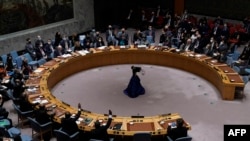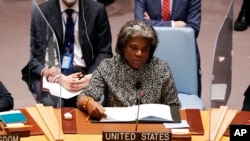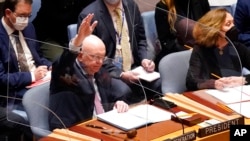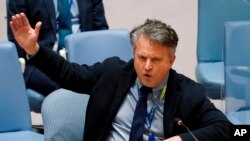Russia blocked a move Friday in the U.N. Security Council to condemn and halt its invasion of Ukraine, but several nations said they would seek accountability from the full U.N. membership in the General Assembly.
"Let me put it plainly: Vote yes if you believe in upholding the U.N. Charter. Vote yes if you support Ukraine's — or any state's — right to sovereignty and territorial integrity. Vote yes if you believe Russia should be held to account for its actions," U.S. Ambassador Linda Thomas-Greenfield told the council. "Vote no, or abstain, if you do not uphold the charter, and align yourselves with the aggressive and unprovoked actions of Russia. Just as Russia had a choice, so do you."
The text, drafted by the United States and Albania, was supported by 11 of the 15 council members. China, India and the United Arab Emirates abstained. A resolution needs nine votes in favor and no vetoes to pass.
The Norwegian ambassador questioned whether the Russian ambassador should have even been allowed to vote.
"A veto cast by the aggressor undermines the purpose of the council. It's a violation of the very foundation of the U.N. Charter," Mona Juul said. "Furthermore, in the spirit of the charter, Russia, as a party, should have abstained from voting on this resolution."
Russian dismissal
Russian envoy Vassily Nebenzia, who happens to be president of the council this month, presided over the meeting in which his government was widely condemned. He also had the task of reading out the names of dozens of countries that co-sponsored the measure that sought to reprimand Moscow.
By the end of the meeting, more than 80 countries had joined that list.
Nebenzia dismissed the draft resolution not only as "anti-Russian" but also as anti-Ukrainian, because, he said, it ran counter to the interests of the Ukrainian people.
"Today's draft resolution — your draft resolution — is nothing other than yet another brutal, inhumane move in this Ukrainian chessboard," he said.
He denied that Moscow was waging a war on the Ukrainian people, but rather said it was carrying out a "special operation" against nationalists to protect residents of eastern Ukraine.
"These objectives will soon be achieved, and the Ukrainian people will gain an opportunity to once again independently determine their future," he said.
'Russia is isolated'
The British ambassador called him out on claims that Russia's aggression is in self-defense, to protect people living in the Russian-backed separatist areas.
"This is absurd. Russia's only act of self-defense is the vote they have cast against this resolution today," British Ambassador Barbara Woodward said. "Make no mistake: Russia is isolated. It has no support for the invasion of Ukraine."
Ukraine's envoy said his country is under siege from nearly every direction.
"Last night was the most horrific for Kyiv since, just imagine, 1941, when it was attacked by Nazis," Sergiy Kyslytsya said.
He told the council that his country faces a difficult night ahead, and he took the unusual step of asking the diplomats in the room to have a moment of silence to pray or meditate for peace.
"To pray for souls of those who have already been killed, for souls of those who may be killed," he said. "And I invite the Russian ambassador to pray for salvation."
The Russian ambassador interjected to say the people who have died in eastern Ukraine in the past eight years should also be included. The U.N. says 14,000 people have died in the conflict.
"All human lives are valuable," Nebenzia said.
A round of applause broke out in the chamber after the silence.
"The United Nations was born out of war to end war," U.N. Secretary-General Antonio Guterres told reporters after the vote. "Today, that objective was not achieved. But we must never give up. We must give peace another chance."
He said soldiers need to return to their barracks and leaders need to turn to the path of dialogue and peace.
Next steps
"It was inevitable that Russia would block the Security Council from taking meaningful action over Ukraine," said Comfort Ero, president of the International Crisis Group. "But it is important that all U.N. member states, from all regions, use the U.N. to communicate to Moscow how badly this war will damage its global image."
Human Rights Watch Executive Director Kenneth Roth said that Russia's veto shows its indifference to international law. He urged the General Assembly to step up to fill the void left by the Security Council.
"International scrutiny is needed to spare civilians from possible large-scale violations of international humanitarian law," he said.
"We will be taking this matter to the General Assembly, where the Russian veto does not apply and the nations of the world will continue to hold Russia accountable," Thomas-Greenfield confirmed to reporters.
The draft is likely to be adopted in the coming days with a large majority of the 193 members, sending a strong symbolic message to Moscow that it is largely isolated in the international community because of its aggression.







